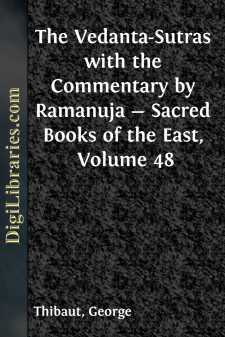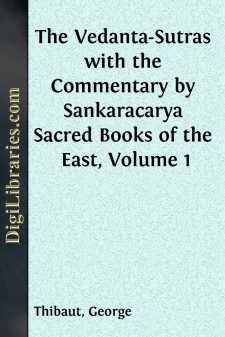Categories
- Antiques & Collectibles 13
- Architecture 36
- Art 48
- Bibles 22
- Biography & Autobiography 813
- Body, Mind & Spirit 142
- Business & Economics 28
- Children's Books 15
- Children's Fiction 12
- Computers 4
- Cooking 94
- Crafts & Hobbies 4
- Drama 346
- Education 46
- Family & Relationships 57
- Fiction 11828
- Games 19
- Gardening 17
- Health & Fitness 34
- History 1377
- House & Home 1
- Humor 147
- Juvenile Fiction 1873
- Juvenile Nonfiction 202
- Language Arts & Disciplines 88
- Law 16
- Literary Collections 686
- Literary Criticism 179
- Mathematics 13
- Medical 41
- Music 40
- Nature 179
- Non-Classifiable 1768
- Performing Arts 7
- Periodicals 1453
- Philosophy 64
- Photography 2
- Poetry 896
- Political Science 203
- Psychology 42
- Reference 154
- Religion 513
- Science 126
- Self-Help 84
- Social Science 81
- Sports & Recreation 34
- Study Aids 3
- Technology & Engineering 59
- Transportation 23
- Travel 463
- True Crime 29
The Vedanta-Sutras with the Commentary by Ramanuja - Sacred Books of the East, Volume 48
by: George Thibaut
Categories:
Description:
Excerpt
INTRODUCTION.
In the Introduction to the first volume of the translation of the 'Vedânta-Sûtras with Sankara's Commentary' (vol. xxxiv of this Series) I have dwelt at some length on the interest which Râmânuja's Commentary may claim—as being, on the one hand, the fullest exposition of what may be called the Theistic Vedânta, and as supplying us, on the other, with means of penetrating to the true meaning of Bâdarâyana's Aphorisms. I do not wish to enter here into a fuller discussion of Râmânuja's work in either of these aspects; an adequate treatment of them would, moreover, require considerably more space than is at my disposal. Some very useful material for the right understanding of Râmânuju's work is to be found in the 'Analytical Outline of Contents' which Messrs. M. Rangâkârya and M. B. Varadarâja Aiyangâr have prefixed to the first volume of their scholarly translation of the Srîbhâshya (Madras, 1899).
The question as to what the Stûras really teach is a critical, not a philosophical one. This distinction seems to have been imperfectly realised by several of those critics, writing in India, who have examined the views expressed in my Introduction to the translation of Sankara's Commentary. A writer should not be taxed with 'philosophic incompetency,' 'hopeless theistic bias due to early training,' and the like, simply because he, on the basis of a purely critical investigation, considers himself entitled to maintain that a certain ancient document sets forth one philosophical view rather than another. I have nowhere expressed an opinion as to the comparative philosophical value of the systems of Sankara and Râmânuja; not because I have no definite opinions on this point, but because to introduce them into a critical enquiry would be purposeless if not objectionable.
The question as to the true meaning of the Sûtras is no doubt of some interest; although the interest of problems of this kind may easily be over-estimated. Among the remarks of critics on my treatment of this problem I have found little of solid value. The main arguments which I have set forth, not so much in favour of the adequacy of Râmânuja's interpretation, as against the validity of Sankarâkârya's understanding of the Sûtras, appear to me not to have been touched. I do not by any means consider the problem a hopeless one; but its solution will not be advanced, in any direction, but by those who will be at the trouble of submitting the entire body of the Sûtras to a new and detailed investigation, availing themselves to the full of the help that is to be derived from the study of all the existing Commentaries.
The present translation of the Srîbhâshya claims to be faithful on the whole, although I must acknowledge that I have aimed rather at making it intelligible and, in a certain sense, readable than scrupulously accurate. If I had to rewrite it, I should feel inclined to go even further in the same direction. Indian Philosophy would, in my opinion, be more readily and widely appreciated than it is at present, if the translators of philosophical works had been somewhat more concerned to throw their versions into a form less strange and repellent to the western reader than literal renderings from technical Sanskrit must needs be in many passages....



